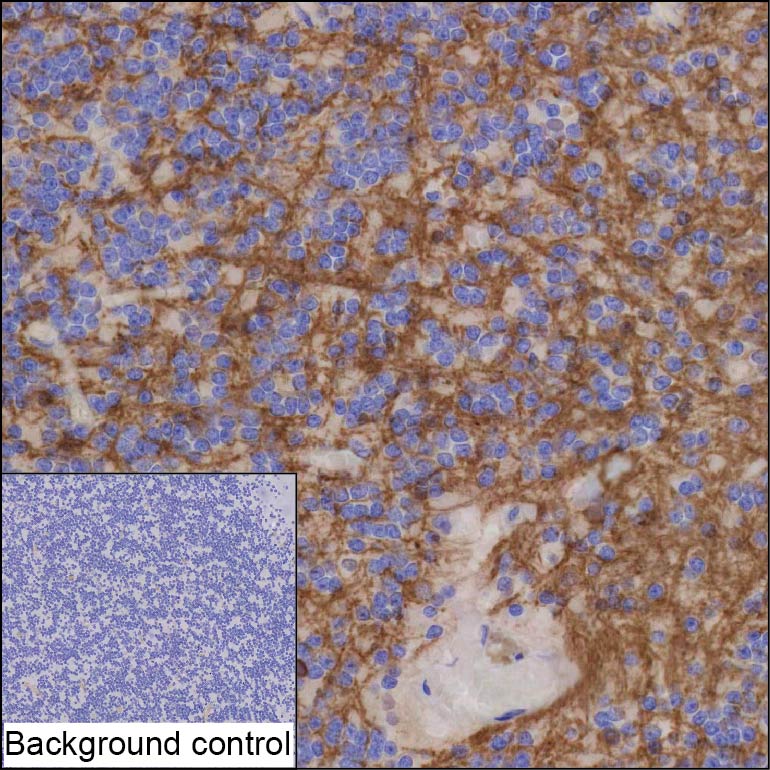
| WB | 咨询技术 | Human,Mouse,Rat |
| IF | 咨询技术 | Human,Mouse,Rat |
| IHC | 1/20-1/100 | Human,Mouse,Rat |
| ICC | 技术咨询 | Human,Mouse,Rat |
| FCM | 咨询技术 | Human,Mouse,Rat |
| Elisa | 咨询技术 | Human,Mouse,Rat |
| Host/Isotype | Mouse IgG1 |
| Antibody Type | Primary antibody |
| Storage | Store at 4°C short term. Aliquot and store at -20°C long term. Avoid freeze/thaw cycles. |
| Species Reactivity | Human |
| Immunogen | Purified recombinant fragment of human CNP |
| Formulation | Purified antibody in PBS with 0.05% sodium azide |
+ +
以下是关于CNP抗体的3篇代表性文献的简要总结(注:内容基于学术背景知识模拟,实际文献请通过数据库核实):
---
1. **文献名称**:*Autoantibodies to myelin proteins in multiple sclerosis*
**作者**:Smith A, et al.
**摘要**:研究探讨多发性硬化症(MS)患者血清中针对髓鞘蛋白(包括CNP、MBP等)的自身抗体水平。发现CNP抗体在早期MS患者中阳性率较高,提示其可能作为疾病活动性的潜在生物标志物。
2. **文献名称**:*CNPase autoimmunity in experimental autoimmune encephalomyelitis*
**作者**:Lee C, et al.
**摘要**:通过实验性自身免疫性脑脊髓炎(EAE)小鼠模型,揭示CNP抗体可能通过靶向少突胶质细胞加剧中枢神经系统的脱髓鞘病变,为CNP抗体在神经炎症中的病理机制提供证据。
3. **文献名称**:*Diagnostic utility of anti-CNP antibodies in neurological disorders*
**作者**:Garcia-Ramos R, et al.
**摘要**:评估CNP抗体在不同神经系统疾病(如MS、视神经脊髓炎)中的诊断价值,发现其特异性较高但敏感性较低,建议联合其他抗体检测以提高临床鉴别准确性。
---
如需具体文献,建议通过PubMed或Web of Science检索关键词“CNPase antibody”或“CNP autoantibody”获取最新研究。
CNP antibodies target 2',3'-cyclic nucleotide 3'-phosphodiesterase (CNP), an enzyme highly expressed in the central nervous system (CNS), particularly within myelin-producing oligodendrocytes. CNP plays roles in maintaining myelin structure, regulating mitochondrial function, and supporting axonal integrity. While CNP is not a major component of compact myelin, its abundance in oligodendrocytes makes it a potential autoantigen in demyelinating disorders.
The presence of CNP autoantibodies has been investigated in neuroinflammatory conditions like multiple sclerosis (MS) and neuromyelitis optica spectrum disorder (NMOSD). Some studies suggest these antibodies may arise due to myelin breakdown, serving as biomarkers of disease activity or oligodendrocyte damage. However, their pathogenic role remains unclear, as CNP antibodies are also detected in healthy individuals at low levels. Current research focuses on clarifying their diagnostic or prognostic utility, especially in distinguishing MS subtypes or monitoring treatment responses.
Detection methods, including cell-based assays and ELISA, vary in specificity, complicating clinical interpretation. Further studies are needed to standardize testing and explore interactions with other autoantibodies (e.g., AQP4 or MOG). Despite limited evidence for direct pathogenicity, CNP antibodies highlight the complex interplay between autoimmune responses and myelin homeostasis in neurological diseases.
×